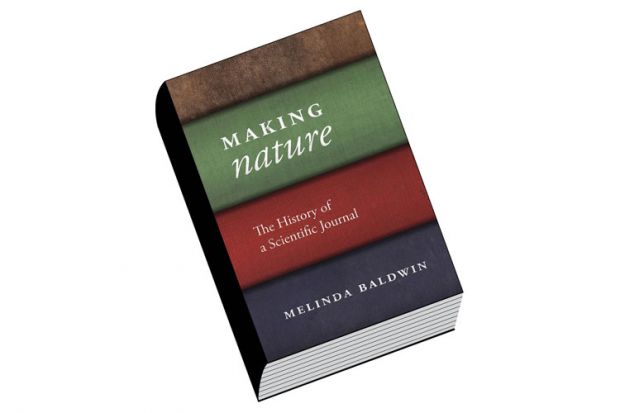At the Noël Coward Theatre in London, Nicole Kidman is currently starring as Rosalind Franklin in Photograph 51. The play revolves around the (mis)use of an X-ray diffraction photograph that provided evidence for the structure of DNA, as announced to the world by James Watson and Francis Crick in April 1953. Franklin’s career has deservedly garnered much attention in recent years, and Anna Ziegler’s play is an account (with artistic licence) of gender, priority and principled behaviour in academic science in the 1950s. A similar concern with the moral and social aspects of science, as seen through science publishing, pervades Melinda Baldwin’s skilful history of the weekly journal Nature, home of course to that famous Watson and Crick paper. However, there is less on the gender issue, despite nice opening comments on the journal’s preferred descriptor: scientist or man of science.
Baldwin’s overall stance is partly an enforced one. There is very little by way of an archive for the journal, which is still published by Macmillan, although it is now part of the burgeoning Nature Publishing Group. We may have lost out by not being able to know, on a consistent basis, who refereed, rejected or accepted which paper and perhaps why, but for all the potential for historical gossip one can see a monotony in that. This has left Baldwin freer to use Nature as a lens to determine how an organ that began life as a decidedly British popular science magazine became an international leader in science publishing, measured by such figures as the huge number (92 per cent) of submissions that fail to make publication and those all-important, if controversial, impact factors. This is a positive but not hagiographic account, and there are some amusing one-liners by a former molecular biology correspondent, Walter Gratzer, who was among a small number of interviewees.
Since its foundation in 1869, Nature has enjoyed the services of just seven editors. These men provide pegs on which Baldwin hangs her chapters, along with events such as the world wars and the Cold War, Nazism, Soviet science and the US’ rise to dominate world science. Each editor brought his own vision and style to the journal. Sir Richard Gregory, who served as its second editor from 1919 to 1938, was not a scientist, and his appointment prompted concerns about whether scientists would continue to support a journal edited by one from outside the fold. They did, but the experiment hasn’t been repeated. Sir John Maddox, who had a background in journalism as well as in science, had two stints (1966 to 1973, 1980 to 1995) and was certainly the most flamboyant.
Contributors and readers have also been terrifically important in shaping Nature, and it is here that the strength and originality of Baldwin’s book comes through. The early impact of the correspondence columns was particularly significant because of Nature’s weekly format, which would offer a crucial advantage until the advent of electronic publishing. Debate was not just about the facts of this or that paper, but also about the position of science as a force for good (or evil) in society, and the intellectual freedom of scientists to conduct their work without religious or political interference. A weekly was also ideal for establishing priority, a much recognised and utilised feature. Watson and Crick would capitalise on it, and what was then a rather casual system of peer review – how times change.
Helen Bynum is honorary research associate in the department of anthropology, University College London, and author of Spitting Blood: The History of Tuberculosis (2012).
Making Nature: The History of a Scientific Journal
By Melinda Baldwin
University of Chicago Press, 328pp, £31.50
ISBN 9780226261454 and 1591 (e-book)
Published 28 September 2015
Register to continue
Why register?
- Registration is free and only takes a moment
- Once registered, you can read 3 articles a month
- Sign up for our newsletter
Subscribe
Or subscribe for unlimited access to:
- Unlimited access to news, views, insights & reviews
- Digital editions
- Digital access to THE’s university and college rankings analysis
Already registered or a current subscriber?




